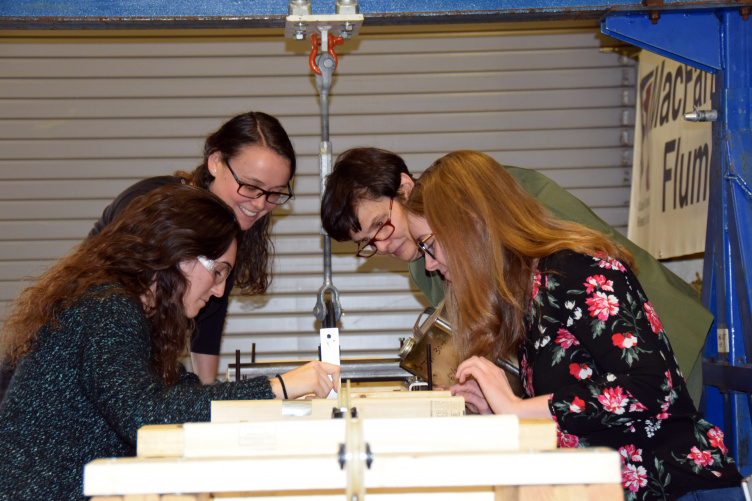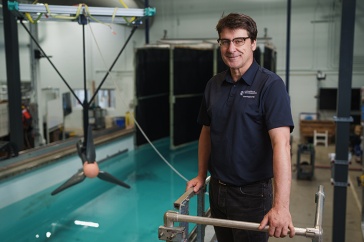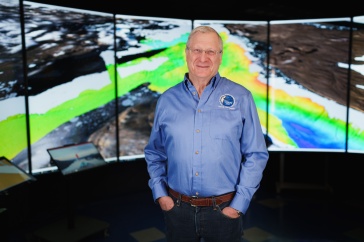
Professor Nancy Kinner is seen here with graduate student Melissa Gloekler, who has been at work on a flume in a one of the CRRC's labs, and Megan Verfaillie ’19 and Jessica Manning ’21, two CEPS students who were recently awarded fellowships to work with experts from across the country on research in the Arctic.
Visiting the Coastal Response Research Center (CRRC) to speak with Megan Verfaillie ’19 and Jessica Manning ’21 — the first UNH students to be awarded fellowships with the Arctic Domain Awareness Center (ADAC) — it’s impossible not be struck by how articulate, engaging and dedicated these young women are to their study of environmental engineering and the health of the planet.

Professor Nancy Kinner, who recommended her students for the elite fellowship, points to that dedication as one of the reasons why. “I am fortunate to have these students,” she says, speaking during her weekly meeting with Verfaillie and Manning at the CRRC where the three discuss their ongoing research and plans for their upcoming fellowships.
“I don’t know where to begin,” Manning says when asked what she’s most excited about. It’s the research, the people and the chance to be in a completely different environment, she explains, and it’s also the opportunity to potentially see the wildlife most impacted by the issues she and Verfaillie hope to help address through their work with ADAC.
Verfaillie agrees. “I’ve always wanted to go to Alaska,” she says. ”I’m so excited to be working with experts from UA and fellows from all over the United States and learning about their different experiences and perspectives.”
Kinner is not only a College of Engineering and Physical Sciences professor of civil and environmental engineering and director of the CRRC, she is also an expert in oil spill response and restoration. ADAC is hosted by the University of Alaska (UA), with work conducted at its campuses in Anchorage and Fairbanks and across a community of academic and industry partners as part of the Department of Homeland Security’s Centers of Excellence. This May, Kinner, Verfaillie and Manning will travel to Alaska for a workshop in advance of the research they’ll undertake alongside UA experts and fellows from across the country.
“I didn’t come into college expecting to have this great a relationship with any of my professors — especially not someone of Dr. Kinner’s caliber.”
Verfaillie, who graduates just two day before they depart and will then begin pursuing her master’s in environmental engineering at UNH, is attending ADAC as a graduate fellow. Manning, also an environmental engineering major, received an undergraduate fellowship.
They’ll be heading to Utqiagvik, Alaska, in the Arctic Circle at a time when they can expect close to 24 hours of daylight. The program will include sampling and data collection on sea ice, oil spill modeling on computers to get a better idea of where oil might go after a spill to better plan mitigation and protection of the environment in the Arctic.
Speaking about their experiences at UNH and the opportunity before them, their enthusiasm is palpable. Both New Hampshire residents — Verfaillie is from Nashua and Manning from Litchfield — say they never imagined college would open doors to a journey like this.
“I didn’t come into college expecting to have this great a relationship with any of my professors — especially not someone of Dr. Kinner’s caliber,” Verfaillie says. “She is one of the most enthusiastic and dedicated people I’ve ever worked with. Her commitment to her students and her respect for our ideas and solutions is inspiring. She truly does believe in her students and wants us to be successful.”

Manning, who first enrolled at UNH as an undeclared CEPS student and was considering both civil and environmental engineering, agrees. It was after taking a course focused on the environment, that her mind was made up. “I could just see the enthusiasm Dr. Kinner has for environmental engineering and how much she cares about her students,” she says. “It was something that I really admired. She makes the time for every single undergraduate who wants to have her time.”
Verfaillie and Manning have quite a bit in common besides their shared major: Both are Hamel Scholars and stay busy in and out of the classroom. Verfaillie is the vice president of the engineering honor society Tau Beta Pi and a volunteer at the Freedom Café in Durham, while Manning is co-president of the Student Honors Council and involved with Compost Cats and intramural basketball.
Manning is thrilled at the opportunity to collaborate with Verfaillie and scholars from across the country through her fellowship. “It’s a mind-blowing experience to be part of something like this,” she says. “Learning about environmental pollution and protection has shown me that I really have a passion for this work.”
ADAC’s mission is to develop and transition technology solutions, innovative products and educational programs to improve situational awareness and crisis response capabilities related to emerging maritime challenges in the dynamic Arctic environment.
Verfaillie who has spent about a year and a half working in Kinner’s lab, decided in accepting the ADAC fellowship to focus her graduate work on oil spill research. “It will be a great collaborative effort,” she says.
Interested in opportunities like this? See what UNH's College of Engineering and Physical Sciences has to offer.
-
Written By:
Jennifer Saunders | Communications and Public Affairs | jennifer.saunders@unh.edu | 603-862-3585
















































